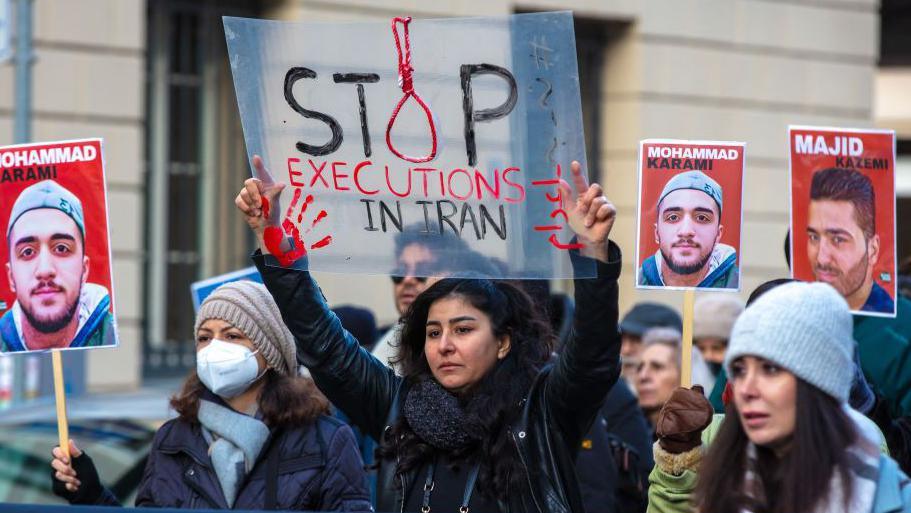Iran fuels 2023 global executions rise - Amnesty

The rise in executions in Iran has given rise to protests around the world
- Published
The number of executions recorded globally in 2023 was the highest for eight years, as some Middle Eastern states sharply increased their use of the death penalty, Amnesty International says.
A total of 1,153 people are known to have been put to death across 16 countries, more than 30% up on 2022, says the group in its annual report.
Iran alone carried out 74% of those executions, stepping up its use of the death penalty for drug offences, while Saudi Arabia accounted for 15%.
The figures exclude China, which is thought to execute thousands of people each year.
"Due to state secrecy, Amnesty’s data does not include the thousands of people believed to have been executed in China, which remains the world’s lead executioner," the organisation said.
"Similarly, Amnesty was unable to put forward figures for North Korea and Vietnam, countries believed to resort to executions extensively."
The total was the highest annual figure recorded by Amnesty since 2015, when 1,634 people were known to have been executed.
Amnesty says Iran put at least 853 people to death last year - up from 576 in 2022 and 314 in 2021. More than half of 2023's executions were for drug-related offences.
Despite the increase in executions worldwide, the number of countries putting people to death was the lowest to date, Amnesty said. No executions were recorded in Belarus, Japan, Myanmar or South Sudan, all of which carried out death sentences in 2022.
“The huge spike in recorded executions was primarily down to Iran," said Amnesty International’s Secretary General, Agnès Callamard.
"The Iranian authorities showed complete disregard for human life and ramped up executions for drug-related offences, further highlighting the discriminatory impact of the death penalty on Iran’s most marginalised and impoverished communities."
In contrast, Pakistan repealed its death penalty for drug offences last year, while the mandatory death penalty was abolished in Malaysia.
Elsewhere in Asia, the Sri Lankan authorities confirmed that the president did not intend to sign execution warrants, allaying concerns it might resume putting people to death.
- Published25 January
- Published26 January
- Published5 March
Amnesty also highlighted figures for the US, the only Western developed country where capital punishment is still on the statute book.
US executions last year rose to 24 from 18 in 2022. Bills to carry out executions by firing squad were introduced in Idaho and Tennessee, while the state assembly of Montana considered a measure to expand the range of substances used in lethal injections.
In South Carolina, a new law was signed to conceal the identity of people or entities involved in the preparation or carrying out of executions.
And earlier this year, the state of Alabama carried out its first execution using nitrogen gas - a method described by Amnesty's Ms Callamard as "cruel" and "untested".
“President Biden must stop delaying his promise to abolish the federal death penalty," she added.